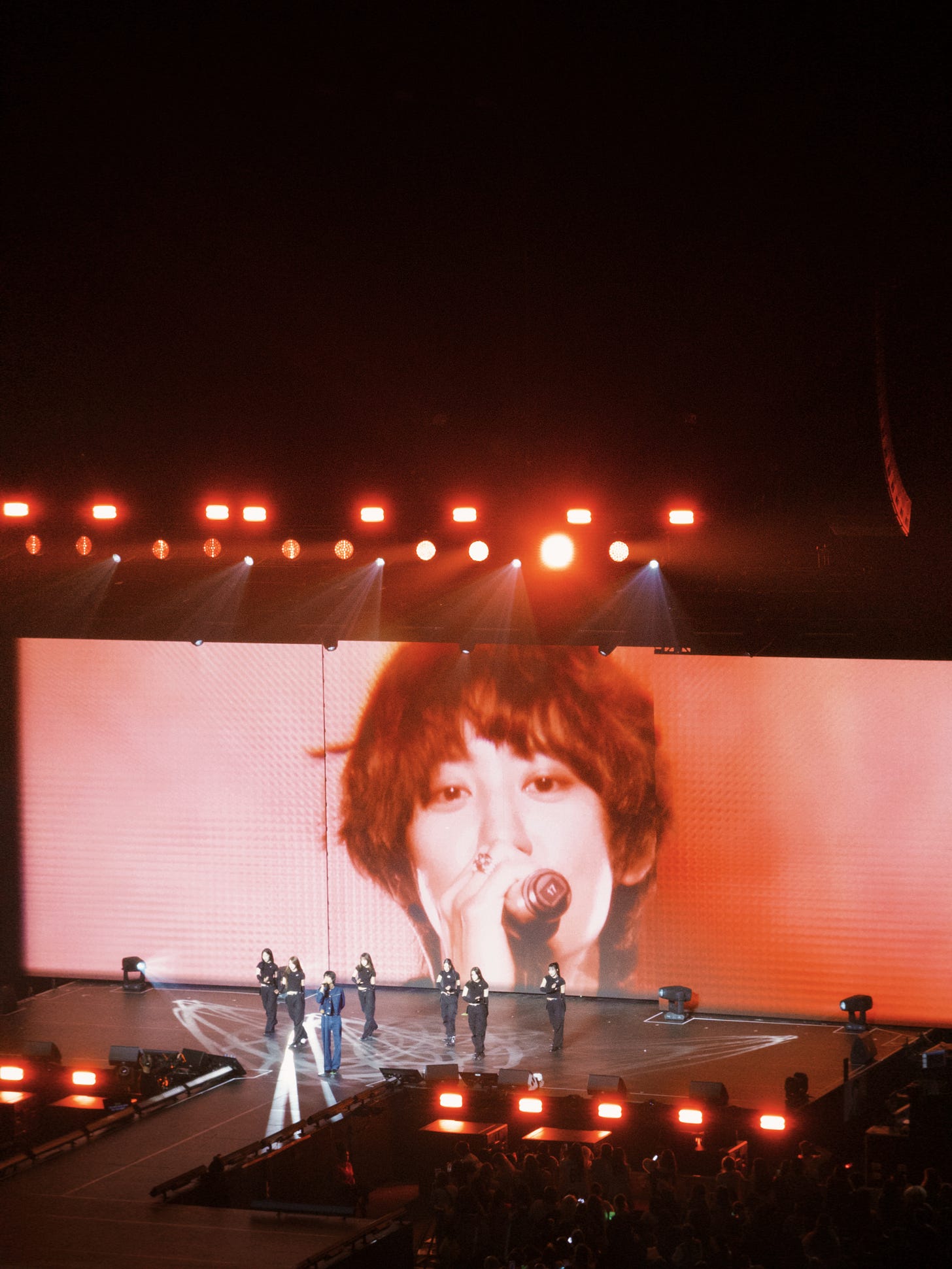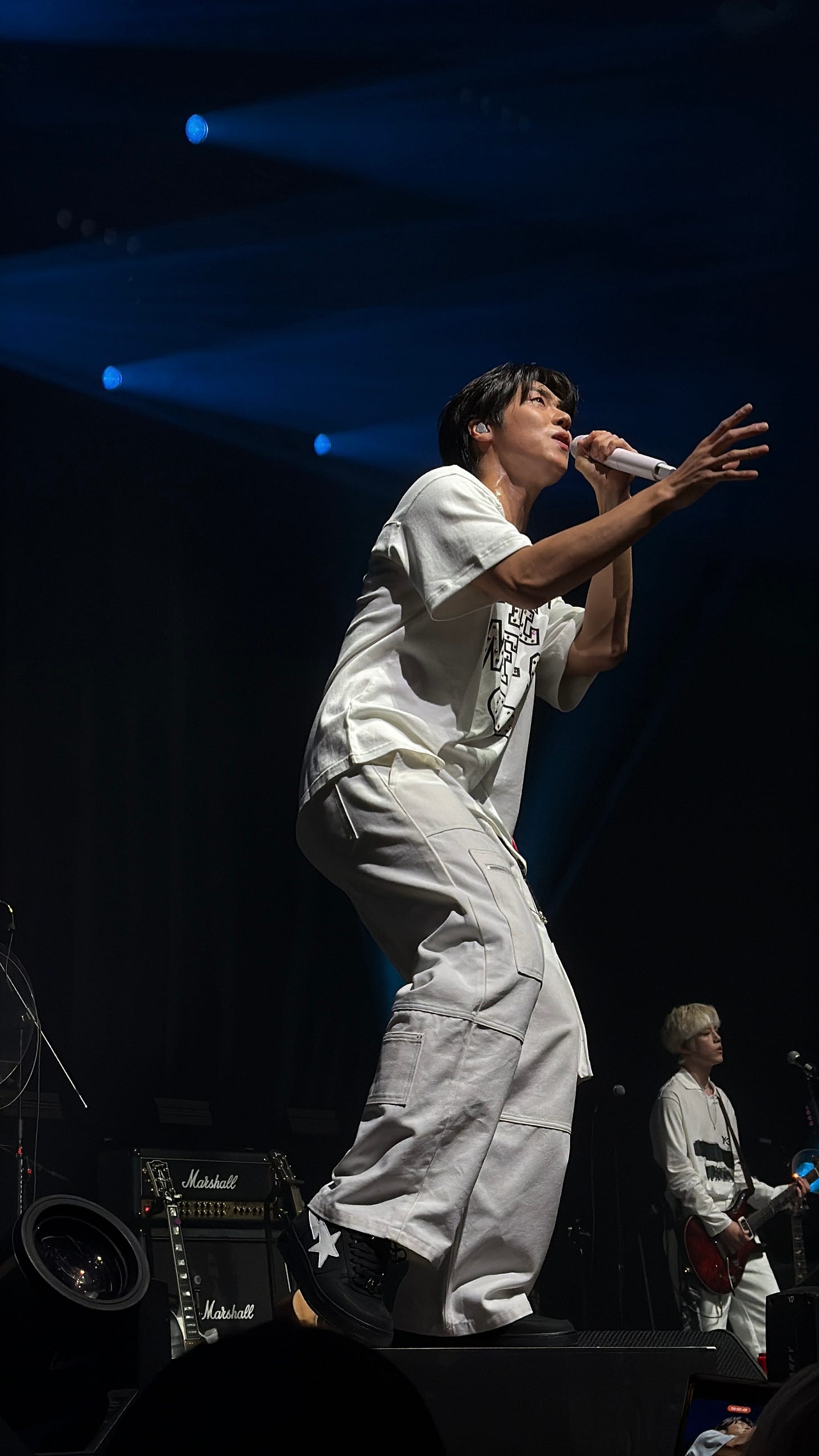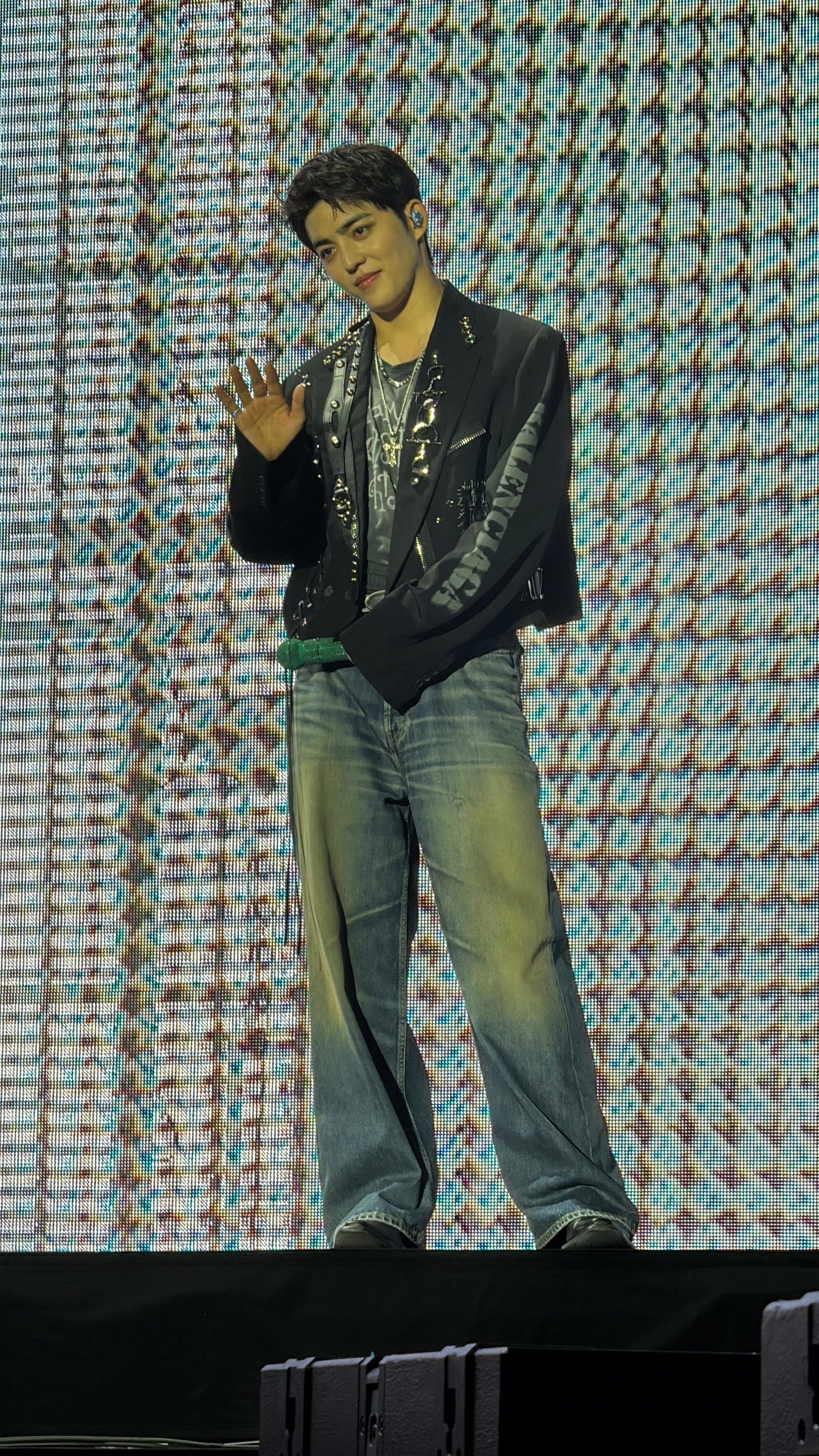#encore!encore!
Recently, I went to see them live…
The Rose at indigo at The O2, June ‘25
I’m a debut fan since 2017 - call me a fossil.
The tune of “Like We Used To” (좋았는데) still teleports me back to my university days and long, snowy nights when I was drowning in my insecurities. It’s not even on the setlist anymore but I can’t even complain because the lead singer, Woosung, keeps sounding impossibly better and better in the 8 years I’ve listened to him. More raw and human, more than he used to.
Logistics wise, the staff at the O2 are still ill-equipped to handle K-Pop events, which I’ve already written about in a Note.
The floor ticket holders get told to stand in one line until we ask someone else and they say no, you’re not supposed to be here. Go around the back. And we get to the back and there are three more line-ends and we have to ask multiple fans along the line to confirm which one we are supposed to be in. No signage, no organisation, pure vibes and mutual aid between concert-goers. It gets worse when there are different kinds of floor tickets at other idol shows: GA, GA with a VIP Package, Platinum GA without the VIP Package. No one in the 5 mile radius is bothered to learn the K-Pop ticketing system and everyone is fully ready to mislead exhausted fans around the venue, like monkeys on chains, before shouting at you for being in the wrong place. I’ve never had a 100% smooth-sailing K-Pop concert experience in the Euroamerican venues and I doubt I ever will.
The band’s sonic diversity is severely underappreciated. I think they’re one of the rare groups from Korea to have balanced personal flair and agility well, to have kept their signature sounds as they experimented with new elements. It is a joy to witness their growth. The setlist is curated with careful thought and a real heart, covering a stunning breadth of musical styles, and we are on our feet most of the time, feeling hyped and fulfilled.
They’re decidedly non-idols. They want to set themselves apart from the majority of the industry and the signs are subtle but everywhere. The venue is an intimate live music club with a capacity of less than 3K, which is a group decision, and it makes them look like theatre kids in a school production. It makes them touchable. There are no outfit changes, minimum makeup, no music videos playing on a screen, no conceptual films between sets.
There are minimum talking and fan service, but when they do, they sound like a Western mellow rock band than a K-Pop group. Woosung is Korean-American and crowd-controls like one, his laid-back Californian accent peeking through as he banters and quips. The other lead singer, Dojoon, to my surprise, also speaks fluently, albeit with more formalities and less ease. He enunciates like a soundbite in an English listening exam. It’s endearing. While the talking segments in idol concerts often sound scripted, rehearsed and repetitive, theirs were organic. The flow of the programme feels less regimented. There are hecklers but they would not hesitate to respond with humour and grace.
They encourage fans to take photos and videos, although I barely see anyone holding up their phones. Barely anyone has light sticks (still severely overpriced), no photo cards are traded anywhere. I haven’t been to a gig so comfortingly simple in a long while.
The demographic is largely white and older than your average K-Pop crowd. Lots of queer fans, to my delight. The British lady to my left is possibly in her late forties and does not know a single lyric, but she dances just as hard as everyone else.
I befriend two girls in the queue and 2 minutes into our chit-chat, one of them asks: “are you into any other K-Pop groups?” And a bond is built from there. Now, we exist to each other. Isn’t that beautiful?
The stage is decorated with bouquets of fresh roses and at the end of the show, the members throw them into the crowd. A sea of hands shoot up to grab them and I briefly wonder if the flowers are de-thorned. Either way it encapsulates what it means to be a fan: to hold on tight to a rose even if it makes you bleed, and to feel loved when it doesn’t. To want.
SMTown Live at the O2, June ‘25
A bittersweet rollercoaster of a night, marvelling at just how old I am compared to every other fan in the venue, but feeling lucky because I’ve seen it all come to this moment with my eyes.
Just way too loud. So loud. Like I mentioned before, the venue is not equipped to blast this kind of music at this volume, especially the songs of the newer generation of K-Pop groups with a lot of beats and no melodies. Most of them are just catchy noises at an unsafe decibel.
The pre-debut male trainees, SMTR25, whip out some of the most synchronised, aesthetically satisfying and powerful performances I’ve seen. The steps are sharp and the formation changes clean, and more importantly, everyone dances with a fierceness and a hunger I haven’t seen since 2015. They perform in survival mode and that’s why survival shows gather the most fans. A sink-or-swim situation makes their eyes burn and a matter of life-or-death brings out the most vitality in their strides.
Older groups get a lot less exposure, sometimes even through newer groups doing a nostalgic cover of them instead of performing the songs themselves. It feels like they are passing the baton onto younger bodies, and looking at EXO consisting of only three people makes me wither.
The Made-In-Britain K-Pop boy group HelloALICE is a thing I neither knew about beforehand nor feel comfortable with. I can’t figure out who’s being exploited here. The One Direction-esque members are white men in K-Pop glam, all jarringly speaking in a roadmen accent. They talk the fan service talk, obviously having undergone Korean media training, but make generic Benson Boone/JVKE-style tracks that carry a whiff of K-Pop influence. They remind me too often of white guys on Hinge who writes Japanese characters in their profiles, because it is now considered “cool” and “unique”. It’s clear that they do not know anyone from the actual SM company, do not speak the language and therefore do not interact with their coworkers. At the end of the show while all other idols are doing the send-off laps around the stage, they are huddled in a corner taking selfies. Who are they trying to appeal to, I wonder? Asian female fans who are ex-Directioners? British female fans who dabble in K-Pop? A secret third thing that’s somewhere in between, the third-culture viewers in need of something niche?
Only one “family” song is performed collectively, but there is minimum interaction between the female and male idols, which is a new thing. Everyone tries to avoid dating rumours a bit too hard, lest fans from all sides criticise their boundary-crossing. Every group pick out posters from their fandom and waves to their fans specifically. There’s seemingly no sense of unity despite all the lovey-dovey talk of camaraderie, only factions, camps, gendered cliques.
As they sing the family song, the camera pans over all their faces and I can’t help but lament, real boomer-ly, at this conveyor belt sushi bar of prettiness that is at once too hopeful and hopeless. I and my fellow oldie friends feel a sense of doom despite the conceptual film blabbering about “making this culture last forever” and preserving the grand legacy of K-Pop’s founding father. Somewhere along the way we’ve stopped knowing what this culture is, and these pretty faces will become equally unrecognisable.
Billie Eilish “Hit Me Hard and Soft” at the O2, July ‘25
Very cool. She makes me feel like I’m a teenager who’s extremely uncool, but not in an uncomfortable way. Setlist is a wild pendulum swinging from laser-psychedelic-rave-sensuality to messy-bloody-fleshy vulnerability. Her talent is unquestionable from the song production to the delivery, and I just cannot imagine the amount of new peaks she will hit in the future.
Stage design ensures that the GA is fairly evenly spread out and that all fans (regardless of height) get to see her up close, without having to queue for hours, which I strongly commend. LED screens are numerous and dispersed but the graphics are unique and in coherence with the overall aesthetic. It’s as fair as it can get despite pricing differences, and she’s also famously adamant on protecting resale tickets from bots and scalpers. I personally bought my tickets from another fan, and the transfer service opened some 24 hours ahead of the show to achieve the tightest turnaround window possible, fending off fraud and non-fan activity.
She is startlingly young in person. Billie’s speaking voice makes clear that she’s in her adolescence, and my friend and I are hit doubly hard by the rawness in her performances after this realisation. There is an immense loneliness laced in the show, and it’s not just because she sings about breakups. To be an artist is to be exposed in every sense of the word, and the more she bares open to the spotlight as a part of her art, the more her youth is consumed by its shadows. It’s hell on earth to be heavenly. Seeing “THE GREATEST” live is an immersive experience of the weight of her pain, the very thing that inspired the song but also what we’re viscerally inflicting on her by perceiving the performance.
(flash warning!)
…and I’ll be thinking (sobbing) about this for a long time.
Her fans are literal children. I get the appeal of her to teenage and pre-teen girls because she’s just so cool, but listening to these girls scream lyrics about cunnilingus word for word or sexual/emotional abuse and neglect at the top of their lungs as if they’ve been through three divorces…is interesting. I think about this Substack piece I read a while ago:
…and I think maybe Billie is indeed a better option to listen to. At least these girls will know what kind of pleasure they should be expecting in bed, and call out anyone who’s incompetent. At least they can shout “you’re so full of shit” when they’re being love-bombed, hopefully.
N.Flying “FULL CIRCLE” tour at indigo at the O2, October ’25
My Birthday show! There is truly no better place to age other than the front rows of a concert.
Pre-pandemic groups from the Golden Era of K-pop still slap, from their vocals, stage charisma, down to intra-group banter and audience interactions. The setlist is a smooth run of their top hits, like the legendary “Rooftop” (that got a standing ovation and the whole room belting in unison), intermingled with their lesser known gems, and it holds your attention throughout. The main vocalist Seunghyub is disarmingly hot in person.
The group is six days older than SEVENTEEN and the members are in their thirties, which gave me a full-body shock. The K-pop industry completely destabilises your perception of age because everyone gets their breakout at different points of their careers—if they’re lucky enough to get it—and late fame obscures their seniority. In my head N.flying feels as young as Stray Kids who debuted in 2018, because that’s when they entered the public’s eyes, but by then they have already gone through years of anonymity, personnel changes and multiple albums with middle-of-the-road sales. This is their first tour after all the members returned from their enlistments. It’s only up from here, I hope.
The intimacy of Indigo as a venue allows for better acoustics and, much more importantly, for the fans to feel like they’re in the presence of the idols. Funnily enough, that’s not a given when it comes to watching them live. Their voices reverberate comfortingly within the four walls and I’m struck again with how much it felt like watching a high school talent show, and we’re all heading to get fried chicken afterwards.
The closer you are to the stage, the more you are a part of the performance. Because we are now fully visible to the band members in the front row, I feel like I couldn’t yawn or look bored or tired, and I must be on my best behaviour. I am now in their eyeshot. I now have to entertain them instead. It’s the most comical and ironical feeling. The industry punishes the most devoted.
SEVENTEEN at BMO Stadium, Los Angeles, October ’25
Yes, I did it again.
A lot has changed and a lot hasn’t. Logistics at BMO is dependably horrendous - timings for various queues and pre-show procedures keep changing, locations for things aren’t clearly communicated, security are strict and slack at the same time. I have heard at at later stops in Texas and Washington, fans were sexually harassed by venue staff and rudely body-searched on suspicion that she brought a professional camera in. In Los Angeles, I was first given a broken VIP gift bag and when I asked for a new one, I was told that they have “meticulously checked the quality of each package” before dissemination and won’t change it. I insisted. They caved. It just constantly feels like fans are fighting to enjoy the show, which is the bare minimum.
Enlistment horrors hit the group hard, and the members know it. The show was visibly emptier without all the fans of the enlisted members in attendance, especially since poor planning on HYBE’s end made it fall on a Thursday evening. I can see S.COUPS constantly looking at the unsold upper floor seats that were covered by black cloths. They talk about their gratitude that we’re still here. They talk about asking us to wait. It’s a privilege to cheer on a group at its most vulnerable, while they experience paranoia and insecurities like they never have before. It’s a beautiful thing to age with them, to feel our hearts break with theirs.
Knowing that they aren’t as powerful as when they were 13 people, they bring out some of the most intense tracks to perform and compensate for that lack. Meanwhile, the tong-city they experimented with last year was understandably continued, as pop-ups and collaborations with restaurants sprout out of K-town and beyond. It seems like they’re using every means necessary to maximise exposure, especially when the group is undergoing a serious slump.
The rift between Korean fans and American fans grow deeper, even though it’s an age-old war. Fans back home have always felt like the members are “looser” abroad, interacting with fans more affectionately, initiating physical contact, and pandering to the American crowd for clout. Indeed this American leg has seen SEVENTEEN take vodka shots handed to them by fans by the barricade, caress the fans’ cheeks, give out bear hugs across the barriers, get into the crowd and surprise fans from behind. They complain that this is unthinkable and wouldn’t be allowed in Asia, and Korean concert goers are always told off for anything remotely. Southeast Asian fans were even hit with a pointed “Fan Etiquette” notice before their leg, which caused Twitter uproar. SEA argued that it felt like a targeted stink eye, which, I mean, fair. At this point it could no longer be attributed to “cultural differences” or strategic considerations, but we need to call it what it is: K-pop is racist against its largest markets in Asia. It lets America get away with a lot, because home bases are considered safely bagged, but America is the territory they need to conquer and can’t afford to lose.







